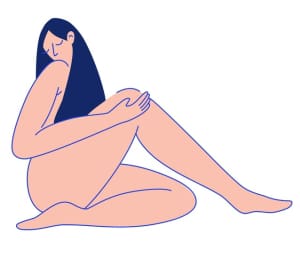
Body Liberation Therapy: How to work with body shaming clients
$45.00
This course is no longer available
As clinicians we have been working hard to combat hidden biases and stigma that impact clients, but how do we work with body shame and self-deprecating thoughts about bodies when it is so prevalent in our culture? Body shaming presents itself in a plethora of ways, including depression, social anxiety, substance abuse, and isolation. It is also one of the strongest risk factors for developing eating disorders and control issues that can lead to self-harm and suicidal thoughts. In this training, we will examine the roots of body shame and learn skills for undoing the harmful grip of self-judgment.
Upon completing this course, participants will be able to:
- Describe medical, psychosocial, moral, and social/cultural perspectives on weight and health and how these tenets affect beliefs about oneself
- Educate clients how history, current diet culture, and media affect attitudes to body acceptance
- Identify terms associated with body liberations such as Body justice, body liberation, intuitive eating, thin idealism, fatphobia, body positivity, diet mentality, the fat acceptance movement, and the Health At Every Size approach.
- Provide clients with activities they can use to start undoing the harmful grip of self-judgment.
Social workers completing this course receive 3 General asynchronous continuing education credits.
For other board approvals, this course qualifies for 3 hours of General Skill Building continuing education training.
Course Instructor: Stacy Blankenship, MSW, LCSW
Recording Date: 09/28/2024
Recorded Live Webinar with downloadable presentation slides and/or handouts, evaluation, and a required quiz. The learner is required to pass with a 70% or higher to achieve the CE certificate of completion. The learner is able to reset the test until a satisfactory score is achieved. CE Training Workshops, LLC, provider #1770, is approved as an ACE provider to offer social work continuing education by the Association of Social Work Boards (ASWB) Approved Continuing Education (ACE) program. Regulatory boards are the final authority on courses accepted for continuing education credit. ACE provider approval period: 8/2/2022 – 8/2/2025. CE Training Workshops, LLC has been approved by NBCC as an Approved Continuing Education Provider, ACEP No. 7091. Programs that do not qualify for NBCC credit are clearly identified. CE Training Workshops, LLC is solely responsible for all aspects of the programs. System Requirements: Firefox, Chrome, Brave, Safari, Edge on any modern operating system (Windows, MacOS, Linux, Android, iOS). A desktop browser is recommended. We do not provide support resources for issues encountered using a mobile device. For more information about our policies and board approval statements, please visit our FAQS page.
Stacy Blankenship, LCSW is a Licensed Clinical Social Worker and an intensively trained in Dialectical Behavioral Therapist completing her training at The Linehan Institute in 2015.
Body Liberation Therapy: How to work with body shaming clients (3HR) Syllabus
I. Historical and Cultural Roots of Body Shame
- Origins of fatphobia linked to colonialism, racism, and moral superiority
- Body size once symbolized wealth, health, and fertility in many ancient cultures
- Eugenics and pseudoscience shaped modern stigma around fatness
- Thinness equated with discipline and worth; fatness with immorality and failure
II. Definitions and Language of Body Liberation
- Key terms: fatphobia, fatmisia, diet mentality, body neutrality, body positivity
- Understanding healthism and the thin ideal
- Reclaiming the word “fat” as a neutral descriptor
- Exploring the impact of BMI and medicalized views of body size
III. Intersectionality and Forms of Body-Based Oppression
- Fatphobia intersects with racism, ableism, sexism, ageism, and classism
- Body shame often heightened for marginalized communities
- Disfigurement, disability, gender nonconformity, and skin conditions contribute to stigma
- Social, medical, and relational barriers disproportionately affect larger-bodied people
IV. Media, Diet Culture, and Internalized Shame
- Unrealistic beauty standards and thin idealism promoted by media
- Photoshop, “before and after” images, and diet ads reinforce body dissatisfaction
- Internalized shame leads to disordered eating and body dysmorphia
- Cultural obsession with transformation over well-being and joy
V. Clinical Harm and Anti-Fat Bias in Therapy
- Therapists may unconsciously reinforce weight stigma
- Misdiagnosis, invalidation, and assumption of disordered eating only in smaller bodies
- Clients report shame, avoidance of therapy, and microaggressions from providers
- Ethical need for body-inclusive, affirming clinical practices
VI. Foundations of Body Liberation Therapy
- Body liberation affirms all bodies as inherently worthy and capable
- Fat-affirming therapy centers autonomy, agency, and choice
- Body Trust, HAES®, and intuitive eating promote sustainable well-being
- Joyful movement and health without weight loss as the goal
VII. Creating Inclusive, Accessible Therapy Spaces
- Ensure sturdy, size-inclusive seating and physical accessibility
- Avoid triggering or appearance-focused décor and messaging
- Use neutral, inclusive language in clinical materials and intake
- Actively dismantle internalized clinician bias and pursue consultation
VIII. Clinical Tools and Writing-Based Interventions
- Exercises: letter to my body, body biography, self-compassion reflections
- Reframe harmful thoughts with CBT and mindfulness strategies
- Explore historical sources of body shame through journaling
- Use creative expression and media detox to support healing
IX. Resources for Client Empowerment and Psychoeducation
- Introduce clients to HAES®, intuitive eating, and joyful movement
- Podcasts, websites, and videos that challenge diet culture
- Encourage embodiment practices and reconnection with body wisdom
- Discuss client goals around nourishment, energy, and pleasure—not weight
X. Honoring Intersectionality and Supporting Liberation
- Center race, gender, class, and ability in therapeutic conversations
- Promote critical awareness of societal norms and systemic oppression
- Support clients in setting boundaries and challenging shame narratives
- Body liberation as a lifelong practice of self-compassion, respect, and justice


